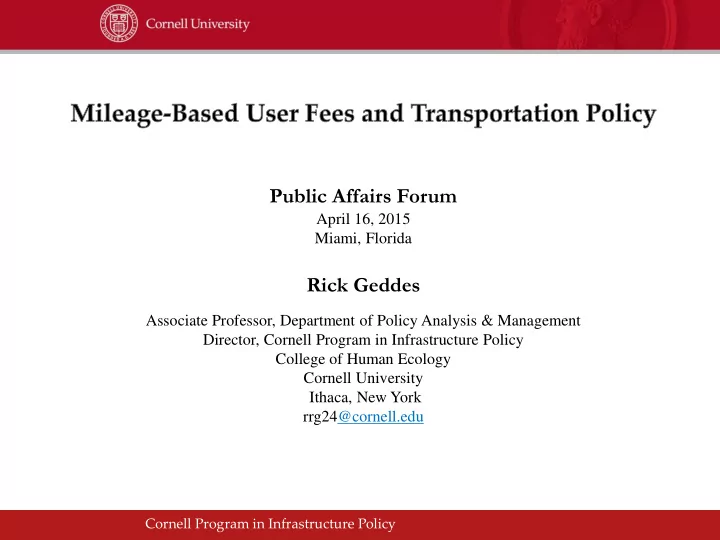

Public Affairs Forum April 16, 2015 Miami, Florida Rick Geddes Associate Professor, Department of Policy Analysis & Management Director, Cornell Program in Infrastructure Policy College of Human Ecology Cornell University Ithaca, New York rrg24@cornell.edu Cornell Program in Infrastructure Policy
U.S. surface transportation system problems on the demand and supply sides . . . Demand side: • Traffic congestion – Wastes 1.9 billion gallons of gas annually (Treasury 2012) – Costs drivers over $100 billion annually in wasted fuel and time (Treasury 2012) – Babies developing near congestion have worse health outcomes (Currie and Walker 2011) – Longer commutes associated with more obesity and higher divorce rates (Lowrey 2011)
Supply side problems: – Thirty- two percent of America’s roads are now in poor or mediocre condition (ASCE 2012) – Poor maintenance costs the average motorist $400 annually in extra maintenance expense (U.S. Treasury 2012) – $67 billion annually in additional operating costs – Transportation investment sometimes poorly directed
America’s Transportation Infrastructure Problem • The U.S. has an infrastructure funding (not financing ) problem • Infrastructure funding is very different from infrastructure financing • Only two broad sources of funding: some type of user fee revenue (e.g. tolls or MBUFs) or some source of broader tax revenue
Infra Funding versus Infra Financing Once funding for transportation is in place, then financing can come from many sources: • Tax-exempt municipal bonds • Privately issued corporate bonds • TIFIA (Transportation Infrastructure Funding and Financing Act) loans • Direct equity investment by a private investor (i.e. the “F” part of a DBFOM PPP) • State revolving funds, etc.
Infra Funding versus Infra Financing • There is no shortage of global financing given a stable, reliable funding source • U.S. funding problem stems from large reliance on fossil fuel taxes at both the federal and state level Fossil fuel tax revenue is falling due to: 1. Rising use of alternative-fuel vehicles (electrics, hydrogen) 2. Increasing efficiency of gas and diesel-fueled vehicles 3. Fuel taxes not indexed to inflation 4. Revenue declines due to fall in annual VMT Problem #1 : Need new policies that providing a reliable stream of dedicated user fees or dedicated general tax revenue insulated from politics
Modern Role of Federal Highway Program • U.S. Interstate System original portion completed in 1991 • Challenge is no longer building out an original system, but operating and maintaining the existing system • Key problem today is deferred maintenance Problem #2: Need new policies to optimize the operation and maintenance of the road system
Test Question: Where/when is this quote from? “ . . . at first glance, it seems hardly possible that this apparently trivial problem of how to charge people for the highway services they use is a key to the whole problem of how to plan and pay for better highways; yet it is just that. This fact cannot be too strongly emphasized. It is a key not only for a system that would involve operation of roads by private enterprise but equally for the present system of public operation. Should a particular road be built? How should it be built? How should it be financed? Should an existing road be maintained, improved, or allowed to deteriorate? If we could charge directly for the service of the road , we could answer those questions — whether under private or public ownership — in the same way that we now decide how many automobiles should be manufactured, what kind of automobiles should be manufactured, how their production should be financed, whether a particular model should be discontinued, and so on [emphasis added]. ”
Mileage-Based User Fees (MBUF) or Vehicle Miles Traveled (VMT) fees • Consider utility-type funding model: charge like kWh of electricity, minutes of cell phone, gallons of water, per therm of natural gas, etc. • MBUF creates a reliable, facility-specific funding source for infrastructure O&M • Reliability of funding source is key for O&M • MBUF allows for contracting out O&M to specialized firms (i.e. pre-commit to a certain level of O&M)
Recommended background reading: Robert Poole and Adrian Moore, Ten Reasons Why a Per-Mile Fee is a Better Highway User Fee than Fuel Taxes , Reason Foundation (February 2014) 10
How to move from per-gallon fee to variable per-mile fee? • Goal is transitioning to a variable per-unit road fee, with widespread contracting out of O&M to reduce deferred maintenance • Variety of state-level responses to funding shortage: Oregon is the leader in MBUFs • Consider federal policies that facilitate movement toward the goal (reduce restrictions on Interstate tolling?)
State Responses to Road Funding Shortage Those Increasing state fuel taxes: California, Maryland, Massachusetts, New Hampshire, Pennsylvania, Wyoming Those Increasing tolls: Delaware, Ohio, Florida (calls for more tolling; VMT fees in discussion) Those implementing/increasing dedicated sales taxes: Arkansas, Virginia Those increasing other dedicated fees: Rhode Island (rental car fees, vehicle fees), Florida (leasing fees), Massachusetts (increase cigarette tax) Those implementing MBUF/VMT Fees: Oregon, serious discussion in California Those considering of fuel tax increases in 2015: Alaska, Arizona, Colorado, Connecticut, Georgia, Idaho, Iowa, Kentucky, Michigan, Minnesota, Mississippi, Missouri, Nebraska, New Jersey, Utah, Washington, etc.
Key Takeaways • Road system provides a service! Troubled on both demand & supply sides • U.S. has a infrastructure funding (not financing!) problem • U.S. problem is no longer building out a new system , but efficiently operating and maintaining the (excellent) one we have! • MBUFs are far better than raising taxes • States are innovating in funding approaches (watch Oregon!) 13
Cornell Program in Infrastructure Policy
Recommend
More recommend